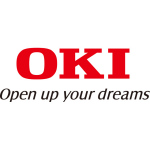-Capable of being used in 200°C high-temperature environments and equipment requiring high-pressure steam sterilization-
TOKYO–(BUSINESS WIRE)–OKI Electric Cable (President: Hideo Yamaguchi, Head office: Kawasaki, Kanagawa Prefecture), the OKI Group’s electric cable company, has developed two new types of environment-proof FPC (flexible printed circuit) products (Note 1) capable of use under harsh conditions, including the conditions found in high-temperature and high-pressure steam environments: a heat-proof FPC and a high-pressure steam-proof FPC. Global sales will commence in June for applications involving equipment and devices that require high-temperature heat treatment or high-pressure steam sterilization. Sales of at least JPY100 million are expected for this fiscal year.
FPCs are flexible printed circuit boards that use plastic film as substrates. Compared to rigid conventional circuit boards (Note 2), they are extremely thin and highly flexible. They can be bent freely, allowing use in narrow spaces in electronic devices; in three-dimensional configurations; and in moving parts subject to repeated bending. Components are mounted on FPCs in the same way as on rigid circuit boards, making the technology key to reducing the size and weight of electronic devices and creating a broad range of applications across industries. FPCs are found in both everyday electronic devices and in industrial electronic equipment.
Demand for FPCs has grown in recent years for use in semiconductor manufacturing equipment involving heat treatment at temperatures of around 200°C and medical equipment requiring high-pressure steam sterilization. These conditions demand the capacity to withstand harsh environments. Exposing conventional FPCs to temperatures of 80°C or above or to humid and high-pressure steam environments degrades adhesives in the insulating layers protecting circuit boards, resulting in peeling of the insulation layer and other defects.
The newly developed heat-proof FPC applies OKI Cable’s proprietary surface treatment to copper foil to improve adhesion to the insulating layer. In addition to this proprietary surface treatment, the high-pressure steam-proof FPC incorporates silicone resin into the insulating layer to improve resistance to high-pressure steam. This maintains insulation layer adhesion even after exposure to high-temperature heat treatment at 200°C for 1,000 hours (for the heat-proof FPC) and after high-pressure steam treatment at 132°C and 0.2 MPa (Note 3) for 15 minutes × 250 cycles (for the high-pressure steam-proof FPC). Insulation resistance and other electrical characteristics meet all the requirements specified by the applicable standard (JPCA-UB01: Note 4).
“The features of FPCs can enable wiring for applications and in devices where FPCs previously could not be used due to operating environment restrictions. We believe the greater freedom in equipment design provided by these characteristics will lead to devices with ever greater functionality,” commented Hideo Yamaguchi, President of OKI Electric Cable.
|
Explanation of terminology |
|
|
*1: |
Flexible printed circuits (FPC) |
|
Also referred to as flexible printed circuit boards or flexible printed wiring boards; printed circuit boards with electrical circuits formed on a substrate by laminating conductive metal such as copper foil to a thin, soft insulating base film (such as polyimide). |
|
|
*2: |
Rigid circuit boards |
|
Hard printed circuit boards based on glass or paper impregnated with epoxy resin. The most prevalent type used due to their relatively simple structure, ease of handling even with surface-mounted components, and low cost. |
|
|
*3: |
MPa (megapascal) |
|
A unit of pressure; one MPa corresponds to the pressure imposed by to a load of approximately 10.2 kg acting on an area measuring one square centimeter. |
|
|
*4: |
JPCA-UB01 |
|
A standard for electronic circuit boards, published by the Japan Electronics Packaging and Circuits Association. |
|
About Oki Electric Industry Co., Ltd. (OKI)
Founded in 1881, OKI is Japan’s leading information and telecommunication manufacturer. Headquartered in Tokyo, Japan, OKI provides top-quality products, technologies, and solutions to customers through its Public Solutions, Enterprise Solutions, Component Products, and Electronics Manufacturing Services businesses. Its various business divisions function synergistically to bring to market exciting new products and technologies that meet a wide range of customer needs in various sectors. Visit OKI’s global website at https://www.oki.com/.
Notes:
– Oki Electric Industry Co., Ltd. and Oki Electric Cable Co., Ltd. are referred to as “OKI” and “OKI Electric Cable” in this document, respectively.
– The names of the companies and products mentioned in this document are the trademarks or registered trademarks of the respective companies and organizations.
Contacts
Press contact:
Oki Electric Industry Co., Ltd.
Public Relations
E-mail: press@oki.com
Customer Contact:
Oki Electric Cable Co., Ltd.
Overseas Sales Dept.
Phone: +81-3-5635-8339
Contact Form: https://www.oki.com/cgi-bin/inquiryForm.cgi?p=k001e



